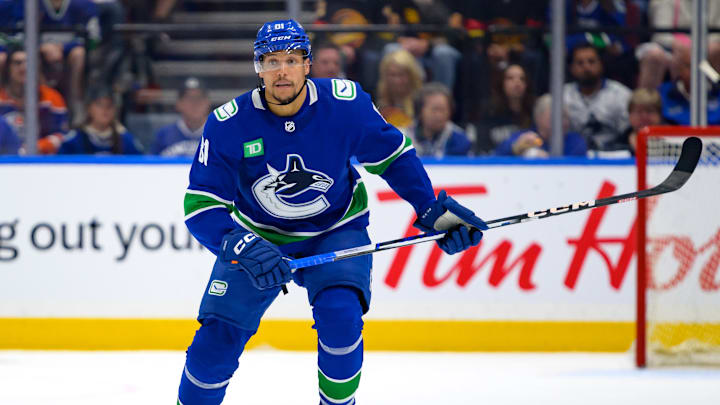To watch the growth in Dakota Joshua's game during his time in Vancouver has been a pleasure for everyone connected to the Canucks organisation, both outside and within. Signed to a two-year, $1.65 million deal back in July 2022, he has proven to be more than excellent value for money.
Joshua set a whole host of personal bests during his first season with the Canucks, and then proved to be even better during the 2023-24 campaign. Among other things, he set new career highs with 18 goals, 14 assists, 32 total points, 14:23 of ice time per game and a +19 rating.
Arguably best of all though was the physical impact of the 28-year-old -- quite literally -- as he led all Canucks players with 245 hits. This continued during the playoffs as he again led the team, with 74 more hits.
Further helping the team, Joshua was a key element of a much improved penalty kill unit, which ranked tied-17th best in the 2023-24 NHL regular season at 79.1 percent efficiency. While this might not sound that impressive, consider that just a season earlier the Canucks were ranked worst in the NHL, at 71.6 percent efficiency.
As much as Joshua's calling card is his effectiveness as a hard-nosed, shutdown forward, the willingness to work on his offensive game has been impressive, helping him develop into an excellent two-way player. After setting his new personal best for points during the 2023-24 regular season, he further highlighted his improved offensive game with eight more points (four goals and four assists) during 13 playoff games.
What will to cost for the Canucks to re-sign Joshua?
With all this said, it does create a challenge for the Canucks, if they are to sign the pending unrestricted free agent to a new deal. Clearly his development and improvement as a player, makes him a more appealing option to other teams around the NHL.
To be clear, both sides want Joshua to return to Vancouver next season, but it will take more than this to make the preference to become a reality. He will understandably want -- and deserve -- an increase on this season's salary of $825,000.
The question is, how much of an increase would be acceptable for both sides? For example, the Canucks might consider a multi-year deal worth an annual average of $2 million reasonable, whereas the belief is Joshua wants around $3 million per season.
In fairness, in its own right $3 million per season seems fair, for the Canucks to bring the 2014 fifth round draft pick back. However, even this could be a reach, given their overall issues with nine unrestricted and two restricted pending free agents to deal with, including the likes of Nikita Zadorov, Elias Lindholm, Filip Hronek and Arturs Silovs.
What we would say is that even taking into account that Joshua could effectively triple his current annual contract value, he would still overall bring less of a cap hit compared to some of the other pending Canucks free agents. Not that this makes it any easier per se in respect of who the team wants to bring back, but it still should count as a valuable factor.
One last thing to consider is speculation from The Athletic's James Mirtle, that the Toronto Maple Leafs might be open to coming after Joshua. (It was actually the Leafs who originally drafted him, before trading his signing rights to the St. Louis Blues.) If the thought of your biggest Canadian rivals snagging him doesn't motivate you to try and get a deal done, then we do know what will!
